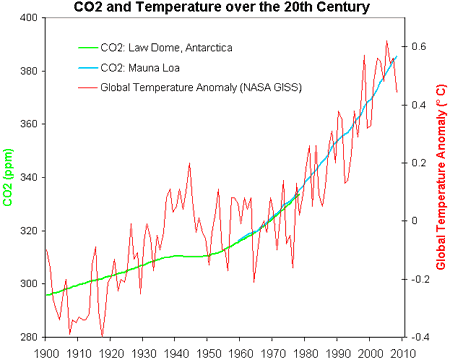NomadPatriot wrote:(not continuing the long quote strings. so resetting Duk. )
you posted a chart showing a +0.9 to -0.4 degree increase / decrease in temperature since 1880 above & below the zero mark. claiming that is due to humans causing climate change.
I posted a chart showing a similar reference to the zero mark with a vastly longer time frame and vastly larger variations of the temperature going from +3 to -8 degrees. showing this is a naturally occurring event throughout earth's history and has nothing to do with humans .
that was the point. earth goes through very long nearly 100,000 year cycles of continental covering glacial periods of cold with an almost predictable repetitive hot spike almost on cue every 100,000 - 125,000 years.
Okay, and the point I'm making is is that what your chart shows are natural fluctuations with the temperature increasing about 1 degree (or less) in a
thousand years. What we're experiencing now is the temperature increasing 1 degree (or more) in a
hundred years. The current rate of warming is
at least ten times more. Depending on where we go from here, it could be 20 times more or 100 times more.
This is the unprecedented part. Not the absolute height of the peak, but the rate of change. All changes result in an increase in the extinction rate, but the faster the change comes, the greater the extinction rate.
coincidentally . in current day , earth is experiencing 1 of those hot spikes that has occurred numerous times before humans were even a developed species.
Yes, but it's almost over. If the natural cycle was dominating, we'd be due for a cool-down now.
all you have said is " Of course there are natural cycles. Nobody, but nobody, has ever denied that. However, what is happening now is in excess of any natural cycle."
do you have any proof it is not part of the natural cycle..?
The unprecedented speed is one element.
The best proof I see, however, is how strongly CO2 concentrations correlate with the temperature rise.

Just one graph among many, which shows a powerful correlation between the CO2 rise and the temperature rise.
Add to that the fact that there isn't currently any natural process that could explain the rapid warming.
your chart shows a +0.9 temperature increase today over the zero mark..
my chart shows a +3 temperature increase over the zero mark before humans were developed that occurred numerous times on cue . .
how is +0.9 over zero in excess of the +3 over zero natural cycle?
shouldn't your chart show a +3.9 over the Zero mark in order for it to be in "excess" of the natural cycle. ? oddly . it doesn't.
Again, it's not absolute numbers that are really dangerous (*yet), it's the rate of change.
But if current rates keep up, the absolute numbers will eventually be dangerous, too.
NomadPatriot wrote:so I will just ask you the same question again . you can choose to explore answering it if you want too..
--> " if humans were not around during all of those previous heat spikes. .what could have caused them. ?
There's quite a number of things:
- Long-term solar cycles. Of course everybody knows about the short-term 11-year sunspot cycles, but there are probably long-term solar cycles. We don't know for sure yet, but it is very likely.
- The wobble in the earth's orbit. Planetary orbits are not perfect ellipses -- over time the pertrubate quite a bit. Even a small difference in how far the earth is from the sun has a significant effect on the climate.
- Volcanism -- the rate at which volcanoes erupt may go through a long-term cycle, which affects temperature.
- Plate tectonics -- when the plates are colliding, high mountain ranges like the Himalayas are formed, causing winds to push higher into the atmosphere and surrender more heat, resulting in cooling. When the plates are moving further apart, strong winds stay lower in the ground and surrender less heat, resulting in a warmer earth.
There's more, but those are the strongest four. The point is they are all Long Term effects, taking place over tens of thousands, hundreds of thousands, millions of years. In the short term, the hundred or so years that we have good data for, none of those things have had any significant effect. The things that have had major effects are all man-made: deforestation, burning fossil fuels, and farming ruminants.


























































































